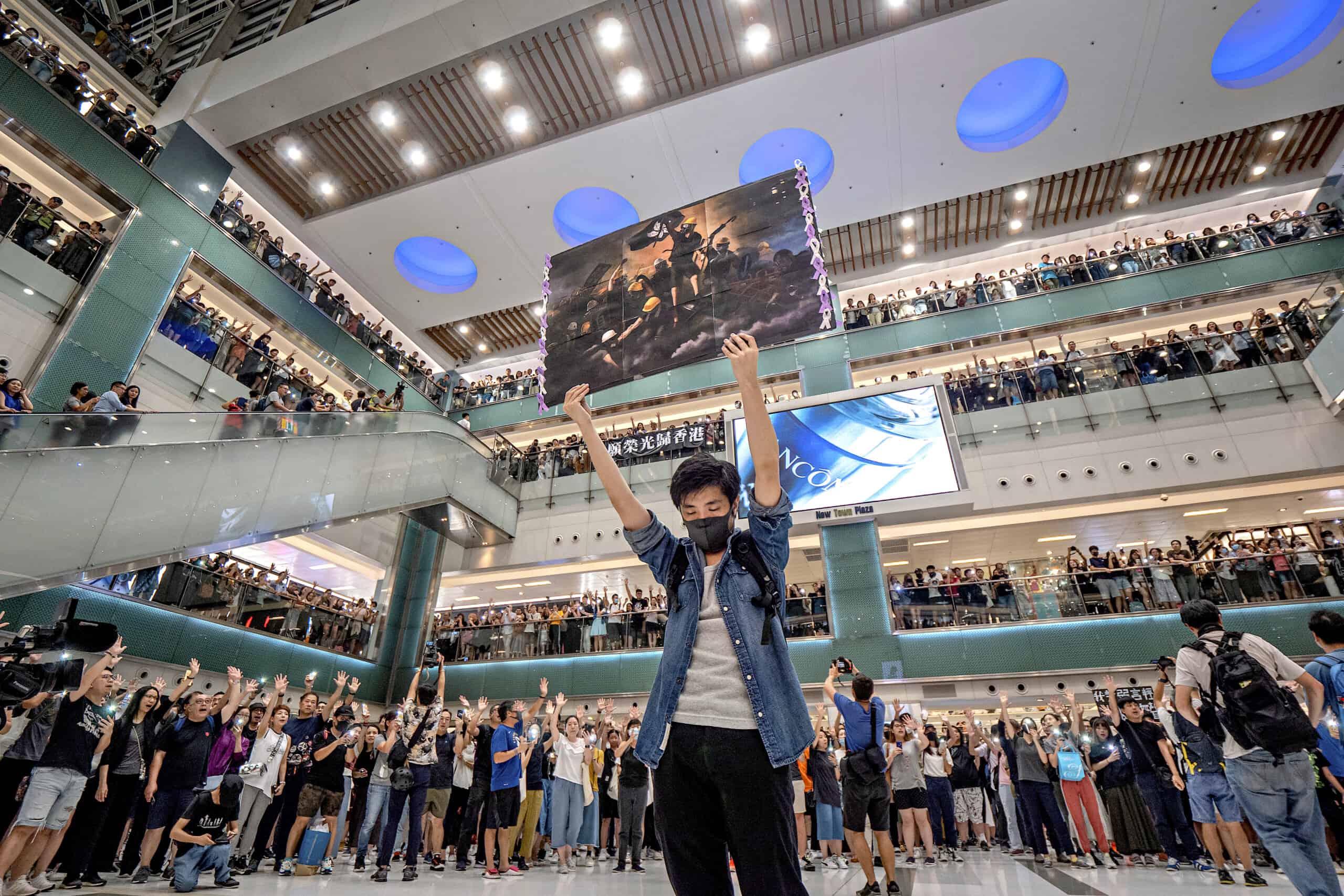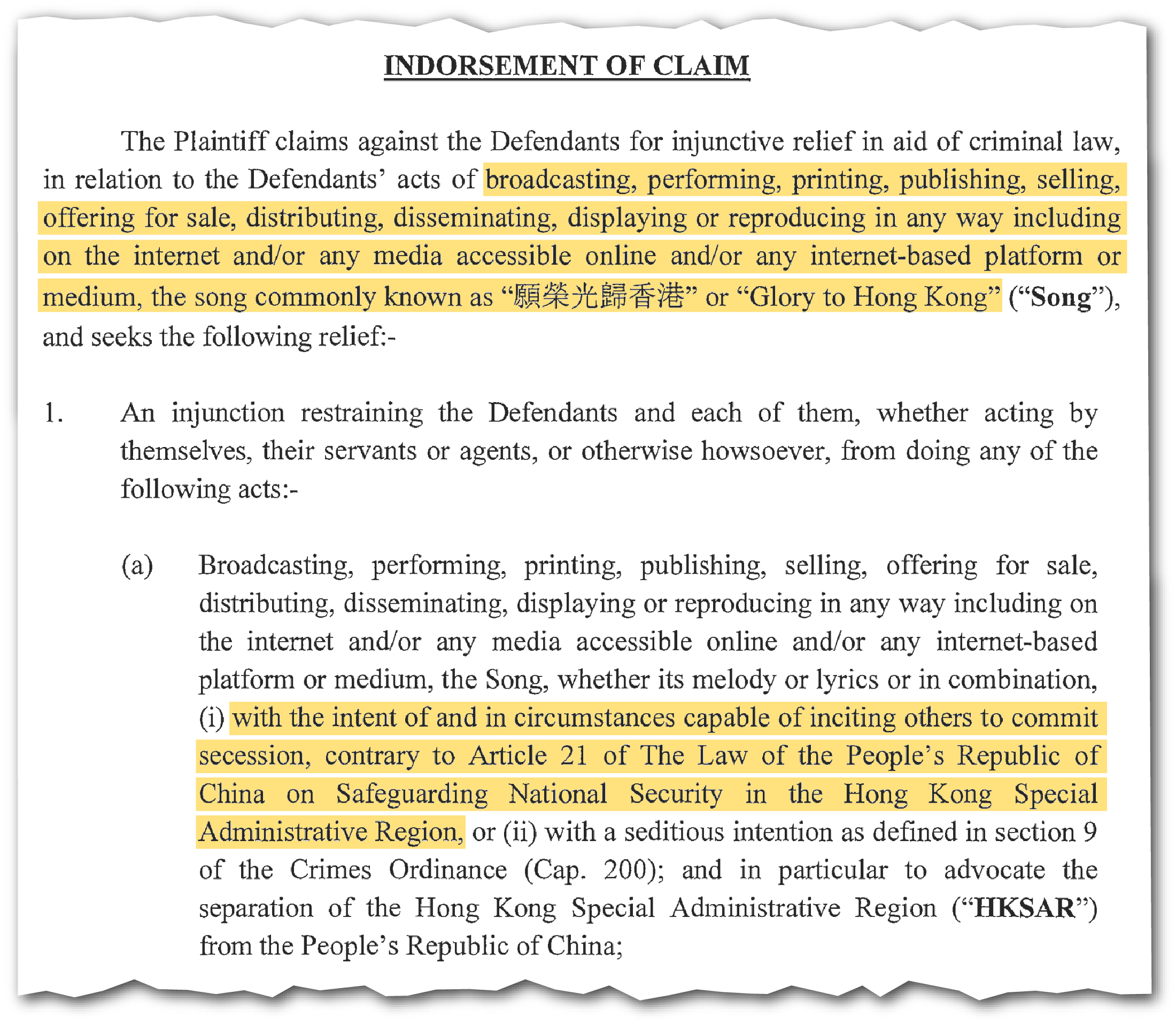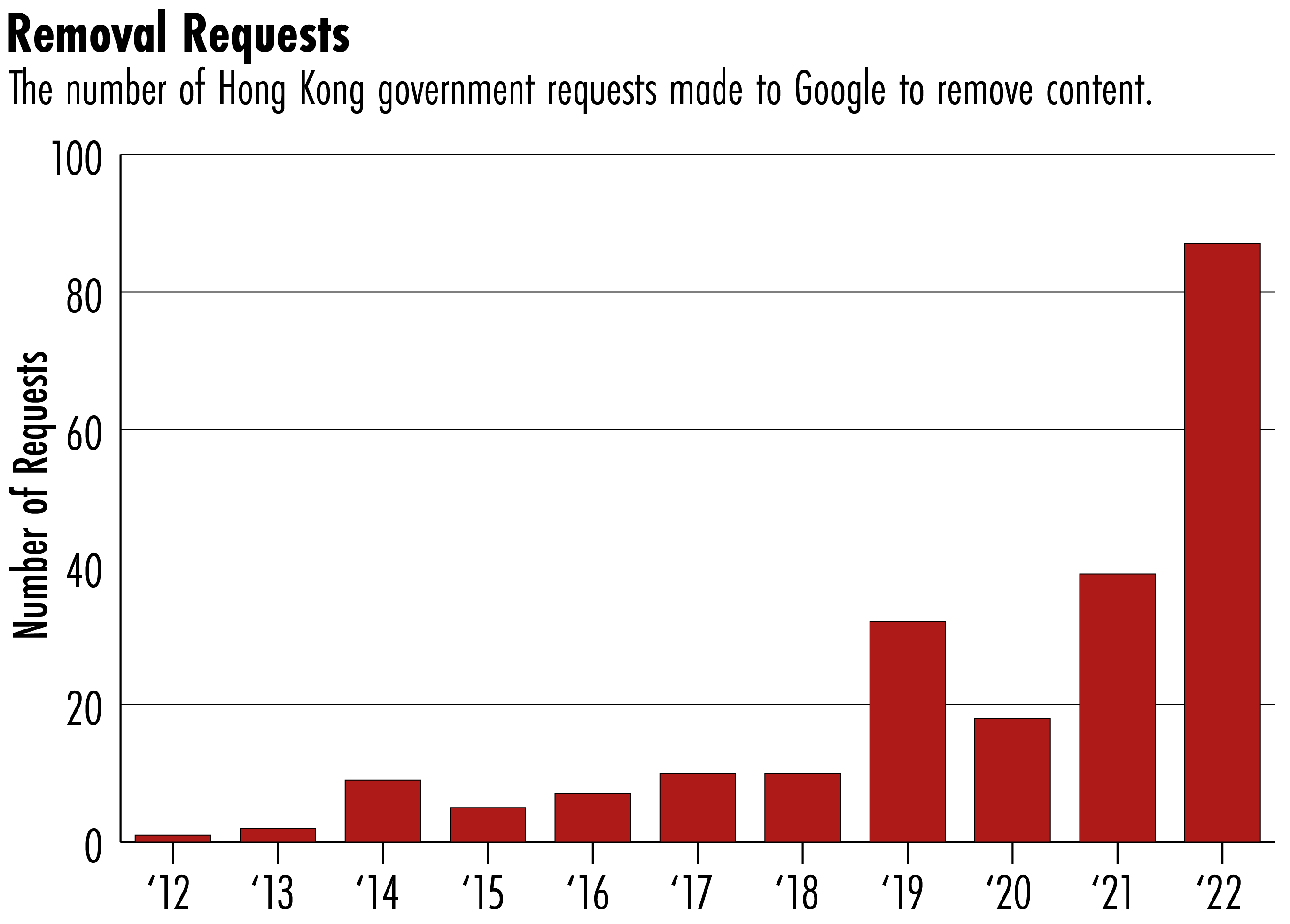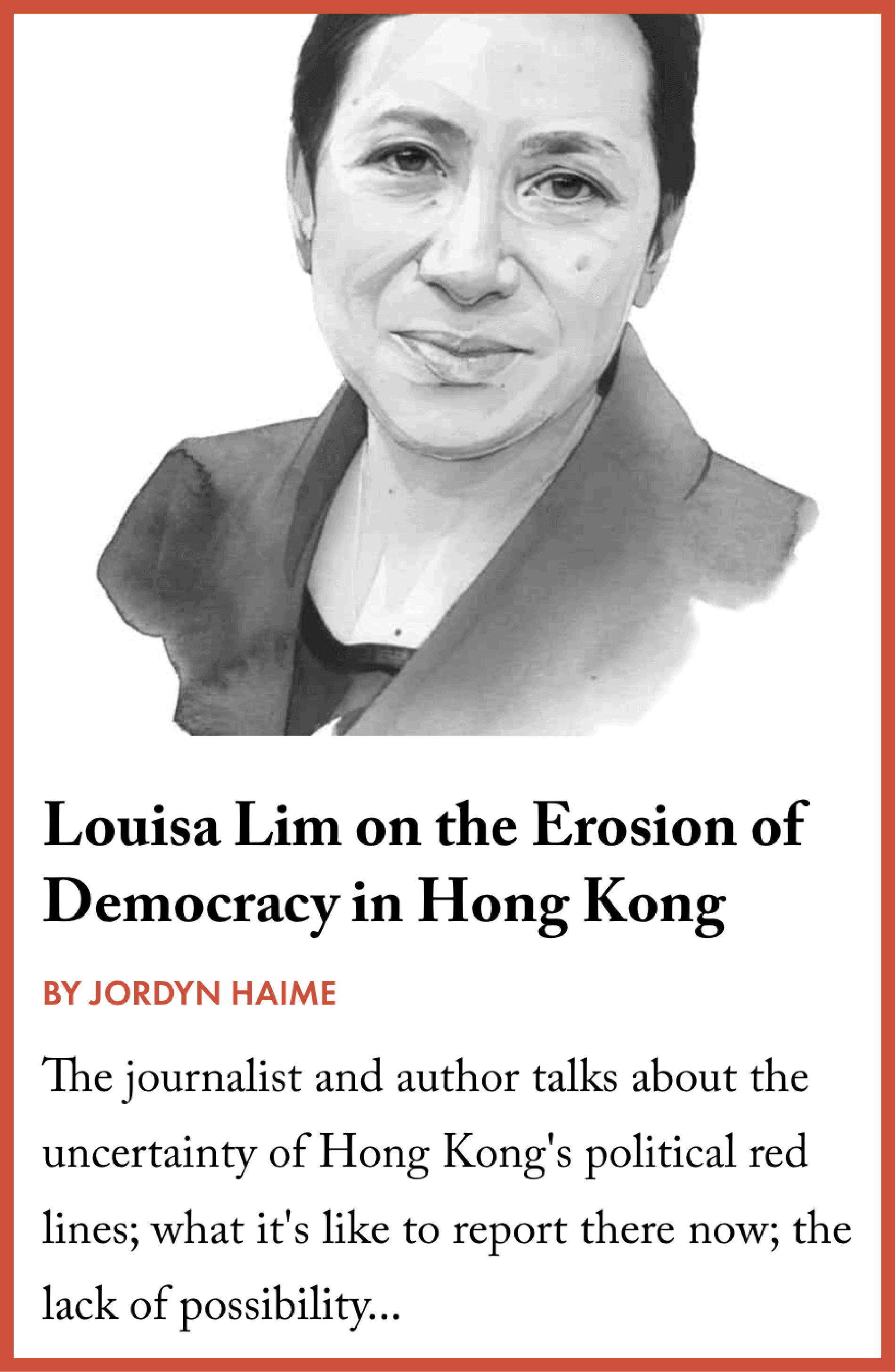
The Hong Kong government’s legal effort to stop a popular protest anthem from appearing on social media platforms is posing a major question for Western tech giants like Meta and Google — will they soon find Asia’s leading financial center as much of a no-go area as mainland China?
The city’s Department of Justice filed an injunction in the High Court on June 6th, seeking to ban the “broadcasting, performing, printing, publishing” of Glory to Hong Kong in any medium. The filing cited thirty-two Youtube videos which contain the anthem, whose Cantonese lyrics praising the cause of freedom were often sung during the demonstrations that swept through the city in 2019 and 2020.

The proposed injunction cites Hong Kong’s controversial 2020 National Security Law (NSL), whose planned introduction sparked that period of unrest. The law promises harsh punishments for acts of “secession,” including pro-democracy speech and protests.
While the court did not immediately grant the government’s injunction request, legal observers believe it could put the restrictions in place at the case’s next hearing, scheduled for July. Any such ruling could force major tech companies to remove content like Glory to Hong Kong from their platforms, some of those observers say, even outside the city — or risk being banned from operating there. That threat itself could trigger their exit from the Hong Kong market, some argue.
“This isn’t an order that would require [tech companies] to take [Glory to Hong Kong] down or to lock it in Hong Kong; this is an order that would require them to take it down globally, meaning no one else could get access to it across the world,” says Samuel Bickett, a fellow at Georgetown’s Center for Asian Law and an advocate for civil liberties in Hong Kong. If internet corporations allow the song to remain on their platforms, Bickett says, “they’re just going to be in continual violation” of the potential injunction, placing their employees at risk of criminal prosecution.
Such concerns could convince U.S. corporations to suspend their local operations, Bickett says. “I don’t see how they can stay in Hong Kong… They’re going to be constantly exposed to raids, and their local employees could be arrested.”

The proposed injunction is not the first sign of growing pressure on internet freedom in Hong Kong. According to figures in its transparency report, Google received 56 requests from the city’s government for the removal of digital content during the second half of 2022, more than four times the 12 it received in the six months before the NSL was implemented in 2020: The company says it complied with nearly a third of the requests. Meta, the owner of Facebook, doesn’t disclose the number of government requests it has received, but says it restricted content in 365 cases in Hong Kong in the second half of 2022, compared with 199 times in the first half of 2020.
Although both companies announced in 2020 that they would no longer comply with requests to supply user data to the Hong Kong government, Google’s transparency report shows that it did so in three cases during the second half of 2020, after the NSL’s passage. The company told the Hong Kong Free Press a year later that the disclosures came in response to two requests involving human trafficking and one emergency request involving potential loss of life. Google and Apple did not respond to The Wire’s requests for comment; Meta declined to comment through its Hong Kong public relations firm. The Hong Kong Department of Justice declined to comment, citing the ongoing legal case.
If foreign bankers don’t feel safe, don’t feel that the rule of law is alive and well, and don’t feel that arbitration can be fairly conducted in Hong Kong, then you have an issue.
Mark Clifford, president of the Committee for Freedom in Hong Kong Foundation and a former executive director of the Asia Business Council
Some legal experts say the proposed injunction may not apply outside Hong Kong. Although the government is “piece by piece undoing freedom” in the territory, says Michael C. Davis, a former law professor at the University of Hong Kong, he believes that the injunction “is more about blocking [the anthem] within Hong Kong only.” If tech firms can compromise by blocking access to the protest anthem and other content deemed subversive within Hong Kong, they may choose to keep operating there while complying with government requests to censor their platforms, Davis says.
Tech companies like Google often do respond to government strictures in other jurisdictions. In the U.S., the search engine routinely removes copyrighted creative content in response to the Digital Millennium Copyright Act; some European countries, such as Germany, have strict prohibitions on online hate speech which can lead their authorities to order content removal. In 2017, the Canadian Supreme Court ruled that Google could be required to remove content worldwide in response to court injunctions there, although the case involved search results for pirated products, and was not political in nature.
Google’s past may hint at its possible future in Hong Kong. In 2006, the company launched a Chinese-language version of its search engine. Elliot Schrage, then a vice president at Google, gave testimony to Congress saying the company would “[respect] the content restrictions imposed by Chinese laws and regulations.” Just four years later, Google announced it would no longer offer a censored version of the search engine after it became aware of a series of cyber attacks, originating in China, on the Gmail accounts of dissidents; the service has since been unavailable in mainland China.
Although Google maintains an office in Hong Kong, its Asian headquarters are in Singapore, and the entire region only accounts for 17 percent of Google’s sales. That figure includes revenue from territories like Taiwan and India with many more users than Hong Kong, a city of 7.5 million people. According to Google Hong Kong’s LinkedIn page, only forty employees are based in its regional office there, compared with roughly 3,000 in Singapore.
Some tech companies have already left Hong Kong: TikTok, owned by the Chinese corporation ByteDance but banned on the mainland, pulled out after the NSL was passed in 2020. At the time, the Hong Kong government said that tech employees could be jailed for six months for refusing to take down censored content, and for one year for refusing to make censored data available to the authorities.
Regardless of whether Western tech corporations leave, Hong Kong’s restrictions on internet freedoms could affect the city’s status as a hub for international businesses. Nearly 40 percent of businesses say they have been negatively affected by the National Security Law, according to the American Chamber of Commerce in Hong Kong’s 2023 survey of business sentiment; just over a third said said they were “pessimistic” or “very pessimistic” about Hong Kong having access to an uncensored internet in the next three years.
Such sentiments may have contributed to the gradual decrease in Hong Kong’s importance to multinational businesses; this year, only 35 percent of ACCHK survey respondents said their Hong Kong office was their headquarters for Asia, compared with 42 percent last year.
“If foreign bankers don’t feel safe, don’t feel that the rule of law is alive and well, and don’t feel that arbitration can be fairly conducted in Hong Kong, then you have an issue” says Mark Clifford, president of the Committee for Freedom in Hong Kong Foundation and a former executive director of the Asia Business Council, a Hong Kong-based group of Asian corporate leaders. “Anecdotally, people are pulling out.” Hong Kong’s population has dropped by nearly 200,000 since the start of 2020.
Even if pro-democracy Hong Kongers are no longer able to freely access Glory to Hong Kong, their fight for civil liberties seems likely to live on. After the government’s injunction request, residents climbed to the top of a local mountain and lit a sign with the anthem’s title. “You can’t erase the memory of that movement overnight. It’s still there,” says Gina Anne Tam, an associate professor of history at Trinity University in Texas. “They are saying ‘We’re still here. We’re still fighting.’”

Isaiah Schrader is a DC-based summer staff writer at The Wire and a PhD candidate at Harvard University, where he researches China’s legal and economic history. His writing has appeared in the South China Morning Post, and he has contributed to the PBS NewsHour’s coverage of China. @isaiahmschrader




